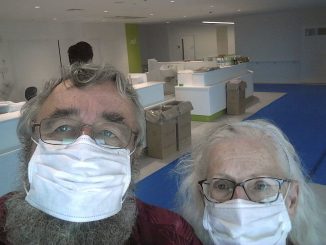 My wife has a beehive in the backyard. Our sons gave it as a birthday present to her as if she had nothing else to do and needed yet another activity in her busy life.
My wife has a beehive in the backyard. Our sons gave it as a birthday present to her as if she had nothing else to do and needed yet another activity in her busy life.
Beehives are a favorite of ministers everywhere. There are hundreds of life lessons on virtues that can be learned from bees; industriousness, cooperation; perseverance. Honey is mentioned 61 times in the Bible signifying something good about to happen — entering “the land of milk and honey” for one prominent example.
I have grown to love the bees too. Except when they sting me and my hand or face swells up. I try to seal up my body with beekeeper protective gear to prevent being stung again, although, like in real life, no matter how many precautions I take, I probably will be stung again.
Life itself is risky.
We have a beautiful hive. It has grown and split and swarmed such that over 2 million bees with the DNA of Queen Lorraine have pollinated flowers and vegetable gardens in a 2-mile radius since 2016.
 The hive has produced extraordinary honey. Once you try it, you will never buy honey in a grocery store again. Our honey has hints of jasmine, quince and hawthorn depending on the season when harvested. It is clear amber, sometimes a darker shade, sometimes lighter but always amazing and magical when you realize it comes from 80,000 bees working in harmony together.
The hive has produced extraordinary honey. Once you try it, you will never buy honey in a grocery store again. Our honey has hints of jasmine, quince and hawthorn depending on the season when harvested. It is clear amber, sometimes a darker shade, sometimes lighter but always amazing and magical when you realize it comes from 80,000 bees working in harmony together.
Until three weeks ago, that is. Through no fault of the bees and to the total surprise of their beekeepers, the hive was invaded by a scourge called the hive beetle. A native of sub-Saharan Africa, they migrated to America in 1988 where they wreak havoc on bee colonies across the nation.
Hive beetles are to beehives what General Sherman was to the South in 1864 — total swift destruction, annihilation and warfare.
In late March, our hive swarmed and 60,000 bees left the hive with the previous queen which is what healthy beehives do. A professional beekeeper came one night to capture the swarm which he took to his farm in Wendell.
Past swarms have happened and our hive has rebuilt each time with a new queen as Nature intended. This time, with no warning whatsoever, even though the hive had been inspected by an expert right before the swarm, hundreds of hive beetles invaded at the worst possible time and proceeded to lay thousands of eggs next to the bee larvae in the honeycomb.
Seven days later, the hive beetle eggs hatched. Tens of thousands of beetle larvae emerged and marched right through the entire hive. The invaders destroyed tens of thousands of bee larvae and pristine honey in a matter of days in what had been a perfectly operating hive just two weeks prior.
Eighty pounds of beautiful honey was converted into a disgusting, fermented waste dump overnight it seemed as hive beetle larvae ate their way through the hive, defecated and “slimed” every frame in the hive. Nothing was left of the pure, sweet amber honey we had enjoyed in previous years; it had all been converted into a blackened, smelly putrid tomb of honeycomb wax. All of the next brood of bees were destroyed as well.
The attack of these hive beetles revealed the fragility of life. One day, everything seemed normal and rocking along in our beloved beehive; the next day brought disaster.
What matters most now in the aftermath is how the bees respond to the crisis.
Despite the total destruction of the beehive by an invading force, the remaining bees are hard at work trying to rebuild the hive with new clean frames supplied by their beekeepers. There may or may not be a viable queen left to sustain the hive; if not, a new one will have to be found and placed in there to restore normal function again.
The bees are too busy working to restore the hive to be blaming other bees or their beekeepers for this crisis. That is what bees do; they work.
Once restored, every precaution will be taken to prevent the reoccurrence of the Hive Beetle Pandemic of 2020. We don’t ever want to go through this again and neither do the bees.



